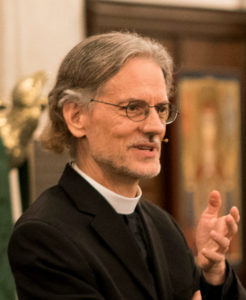The Gift of Age
The room is not quite big enough for everyone who has come. In her reclining chair, the 95-year-old woman takes it all in, with smiles. Her hearing is spotty, her eyesight rather darkened, and her walker ever close to hand. But she is full of delight, for gathered around her on the floor are many of her descendants: a son, a grandson and his wife, and great-grandchildren ranging from sixteen years of age down to one.
The children have been primed to ask her questions about what it was like when she was a girl. They know she grew up on a farm. A perky young fellow asks her about “poop.” This has to be translated. Unfazed, she describes an outhouse—everyone had one in those days. She also describes basins that would be put in bedrooms overnight. Another child asks, “What did you do in the evenings?” She replies that there wasn’t electricity—rural electrification was still in the future. “What chores did you have?” She says there were many. She talks about pumping water by hand (no electric pump) to fill the tank that the cows drank from whenever the rains had fallen short—and to collect water to take inside. She talks too about going with her sister to bring back a couple of cows who often went off by themselves; they had to be encouraged to come home for the night. She mentions another chore: gathering eggs in the chicken coop, where she might find a bullsnake (a large nonpoisonous snake who also liked eating eggs). Sometimes in the mornings before going to school, she milked the cows.
There were many more jobs she did, but in the middle of recounting them she stops and asks the children about their chores. They all want to speak at once. They do table clearing, dishwasher loading and unloading, trash take-away, floor sweeping, laundry folding, and a number of other things. One of the adults points out a difference between their chores and their great-grandmother’s—hers helped keep the farm going so that it could provide food and money for her family. Their household chores were not part of the way their family made money. (But, their father whispers, they sometimes got paid for doing their chores—a complicating factor.)
I could go on, but this is enough. Although their details were particular to their situations—living on a farm nearly 100 years ago versus growing up in an American city today—you, dear reader, can still imagine similar conversations with their own substance. The picture is: an elderly person being visited by and talking with her children’s children’s children. Everyone who observes or learns of such a conversation will remark on how good it is for the elderly person to be remembered and engaged, not left in isolation. And indeed, it was good. The woman had long anticipated their visit and would replay it in her mind long after they returned to their home far away.
But I have told it to you in a different way, blessed reader, in order to emphasize something often missed in such a scene. She had something unique to give them. She, precisely by being old, was able to plant seeds of an earlier generation in their imagination, seeds of a world very different from theirs. It is a world that would remain completely foreign except for the fact that right there before their very eyes was someone who had been there, who had lived in that strange world. With diminished eyesight and perfectly white hair, she spoke of being young and chasing cows. She made the old world intelligible and offered them the chance to imagine her young and vigorous.
This is the gift of the old: the gift of witness—witness not only to the changing things of the world—its technologies, its economics, its structures—but also to the enduring providence of God. Interspersed with her talk about gathering eggs and facing bullsnakes was talk about how God’s providence had pervaded her life. “I feel I have had a Cinderella life,” she told them. But “Cinderella” was not quite the right word. “A fairy-tale life,” she said; a life of wonders, hardships, changes, love, friends.
There is a gift of generations—backwards and forwards and all around us—and it is ever at hand, waiting for us to attend to those who are eager to share their gift of witness.










